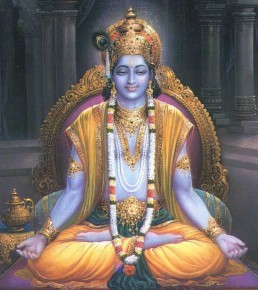Swami Chinmayananda
Swami Chinmayananda Commentary
Such an elaborate description has been given of the Spiritual Presence which vitalises the world-of-matter around man, only to bring about ultimately an evolutionary self-development in the student. The very core of this Geeta-philosophy is the theme that is indicated in the opening stanza of the ‘Ishaavasya Upanishad.’ “The Infinite Truth pervades everything in the world, and therefore, renouncing all the multiplicity, enjoy the Infinitude, and covet not anybody’s wealth.”
Recognition of the body through our abject identifications with it, creates a false sense of individuality, and it is this “ego” that suffers and sighs.
The one commandment that has been repeated all through the Divine Song with great insistence is: “Renounce the ego and act.” The ego is the cause for all our sense of imperfections and sorrows. To the extent we liquidate this sense of separateness and individuality, to that extent we climb into an experience of greater perfection and joy within ourselves.
Krishna has been advising surrender of the “ego” unto the Lord by developing a devoted attitude of dedication. Arjuna, like a true intelligent sceptic, asks: “To which Lord should I renounce all my action? — and dedicate all my activities at which altar? Krishna has defined the Infinite Lord in the previous verse, and now, here He advises Arjuna to surrender his “ego” unto HIM. “FLY UNTO HIM FOR REFUGE WITH ALL YOUR WILL.”
Ours is an age of scepticism. The Arjuna of the Geeta is rather like a typical representative of our own age in this respect. A sceptic is one who questions the existing beliefs; he wants to be intellectually convinced of the logical grounds upon which the existing beliefs stand.
Earlier, Krishna has explained to Arjuna what is indicated by the term Ishwara. Now the call of the Geeta to Arjuna is to surrender himself unto the Lord. The Geeta requires all of us to live and act with our hearts resting in self-dedicated surrender to the Consciousness, the harmonious oneness of Life that pulsates everywhere through all equipments. In short, we are asked to identify ourselves with the Spirit rather than the vehicles of Its expression. He who has thus surrendered totally (Sarva-bhaavena) gains an intellect fully awakened, and thereafter, external circumstances cannot toss and crush his individuality.
The body and mind of such an individual who has learnt ever to keep the refreshing memory of the present cannot make any foolish demands. And when one brings such a brilliant intellect into the affairs of life, all his problems wither away and carpet his path to strive progressively ahead.
To the extent we identify ourselves with Him, to that extent His light and power become ours, and they are called “His Grace” (Prasaada). Ere long, as a result of this “grace” accumulated within, through the integration of the personality and constant surrender of the ego, the individual shall obtain “THE SUPREME PEACE, THE ETERNAL RESTING PLACE.”
WITH ALL ONE’S BEING (Sarva-bhaavena) — This surrender unto the Lord should not be a temporary self-deception. We must grow into a consciousness of the Presence of the Divine in all the planes of our existence. To illustrate such a total devotion, we have the examples of Radha, Hanuman, Prahlada, and others. Without bringing all the levels of our being, and all the facets of our personality, into our love for Him, we cannot drown our finite ego-sense into the joyous lap of the Infinite Lord. Thus, a true devotee must re-orientate his being and must surrender himself as a willing vehicle for His expression. Then and then alone, all the delusions end, and the mortal gains divine experience, and comes to live fully the State of Immortality of the Godhood.
IN CONCLUSION KRISHNA ADDS:
Adi Sankara Commentary
Gaccha saranam, take refuge; tam eva, in Him, the Lord alone; sarva-bhavena, with your whole being, for getting rid of your mundane sufferings, O scion of the Bharata dynasty. Tat-prasadat, through His grace, through God’s grace; prapsyasi, you will attain; param, the supreme; santim, Peace, the highest Tranquillity; and the sasvatam, eternal; sthanam, Abode, the supreme State of Mine who am Visnu.
The Bhagavad Gita with the commentary of Sri Sankaracharya – Translated by Alladi Mahadeva Sastry
Holy Geeta – Commentary by Swami Chinmayananda
The Bhagavad Gita by Eknath Easwaran – Best selling translation of the Bhagavad Gita
The Bhagavad Gita – Translation and Commentary by Swami Sivananda
Bhagavad Gita – Translation and Commentary by Bhaktivedanta Swami Prabupadha
Srimad Bhagavad Gita Chapter 18 – Verse 62 – 18.62 tameva saranam – All Bhagavad Gita (Geeta) Verses in Sanskrit, English, Transliteration, Word Meaning, Translation, Audio, Shankara Bhashya, Adi Sankaracharya Commentary and Links to Videos by Swami Chinmayananda and others – 18-62

